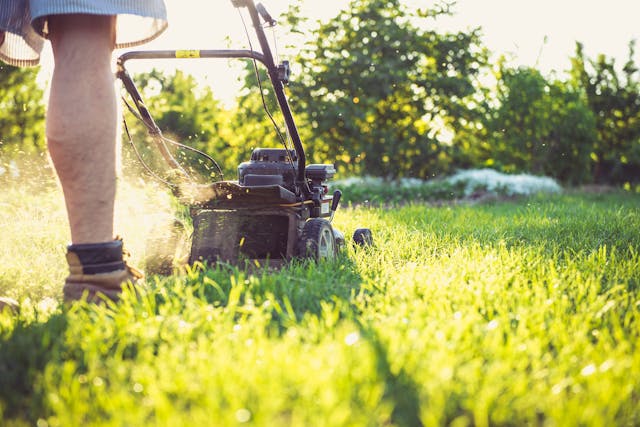
- Regular yard maintenance enhances landscape beauty and property value and contributes positively to the environment with little effort.
- Seasonal tasks such as spring fertilization, autumn leaf removal, and winter preparation ensure the health and vitality of your yard year-round.
- Consistent inspections help identify pest and weed problems early, preventing widespread damage and maintaining yard health.
- Pruning, disease management, and soil care are essential for tree health and ensure their longevity and overall landscape aesthetics.
- When care extends beyond DIY, professionals provide expertise, safety, and specialized services for optimal tree maintenance.
Maintaining a yard is like caring for a living organism; it requires attention, care, and knowledge to thrive. A well-maintained yard enhances your property’s curb appeal and contributes significantly to the ecosystem. Whether you are a seasoned gardener, a new homeowner, or someone with a budding interest in landscaping, understanding the importance of regular yard maintenance is key to fostering a healthy, vibrant landscape.
The Foundation of Yard Care
The benefits of regular yard maintenance extend beyond the visual appeal. A healthy landscape supports local wildlife, contributes to the environment by producing oxygen, and plays a crucial role in the local ecosystem. Moreover, properties with well-maintained landscapes can greatly enhance their value, making regular yard care a wise investment in your property’s future.
Routine Lawn Care
A lush, green lawn is often the centerpiece of a beautiful yard. Achieving and maintaining such a lawn involves more than just occasional watering and mowing:
- Proper Mowing Techniques and Schedules: When done correctly, regular mowing encourages grass growth and health. It’s important to mow according to the type of grass and the season, keeping blades sharp and never cutting more than a third of the grass blade at a time.
- Aeration and Dethatching: These processes allow your lawn to breathe and absorb nutrients effectively. Aeration entails creating small holes in the soil to enable air, water, and nutrients to reach the grass roots more effectively. Dethatching removes the layer of dead turfgrass tissue to encourage a healthier lawn.
- Fertilizing and Weed Control: Choosing the right fertilizer and applying it at the correct time are crucial for developing a robust lawn. Equally important is the timely control of weeds that compete with grass for nutrients and space.
Watering Practices
Water is life, yet too little or too much can lead to problems:
- Optimal Watering Schedules and Techniques: Early morning watering helps reduce evaporation and fungal growth. The amount of water required varies by grass type, soil, and climate, but deep, infrequent watering is generally preferred to shallow, frequent watering.
- Impact of Overwatering and Underwatering: Both can make a weakened lawn susceptible to pests, disease, and weed invasion. Understanding your landscape’s specific needs is critical.
Plant and Shrub Care
Healthy plants and shrubs are essential components of a vibrant yard:
- Pruning Techniques: Proper pruning not only shapes plants and shrubs but also removes dead or diseased branches, promoting healthier growth.
- Choosing the Right Plants: Selecting plants suited to your climate, soil, and sunlight exposure ensures a more resilient landscape.
The Magic of Mulching
Mulch is a multi-purpose miracle for your garden:
- Benefits of Mulching: It retains soil moisture, suppresses weeds, and, as it decomposes, adds nutrients back into the soil.
- Types of Mulch: From organic options like bark and straw to inorganic choices like rubber or stones, each mulch serves different purposes and offers various benefits.
Pest and Disease Control
A proactive approach is essential in managing pests and diseases:
- Identifying Common Pests and Diseases: Early identification can prevent widespread damage. Regular inspections are key.
- Organic and Chemical Control Methods: Depending on your preferences and the severity of the issue, various sustainable and effective treatments are available.
Seasonal Yard Maintenance
Each season brings specific tasks:
- Preparing Your Yard for Each Season: Understanding and implementing seasonal tasks is vital for a year-round healthy landscape from spring fertilization to autumn leaf removal.
- Winterizing Your Yard: Proper preparation for the cold months can significantly affect your landscape’s health and vitality.
Tree Care and Professional Tree Service

Trees, the giants of the landscape, require special attention:
- Health Benefits of Regular Tree Care: Regular pruning, disease management, and soil care ensure the health and longevity of trees.
- Professional Tree Service: Sometimes, the care required goes beyond the scope of DIY maintenance. Professional arborists can provide the necessary tree service that your yard may need.
Conclusion
Regular yard maintenance is a rewarding endeavor that enhances your property’s beauty and value while contributing positively to the environment. By adopting a consistent maintenance routine and understanding the needs of your landscape, you can ensure a healthy, flourishing outdoor space. Remember, a little effort goes a long way in the garden, and the rewards of a well-maintained yard are immense and satisfying.




